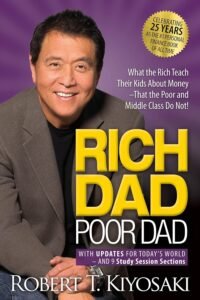“Rich Dad Poor Dad” by Robert T. Kiyosaki is a personal finance book that contrasts the financial philosophies of the author’s two father figures—his biological father (Poor Dad) and the father of his best friend (Rich Dad). Through the lessons learned from these two men, Kiyosaki offers practical advice on wealth building, financial independence, and the importance of financial education. The book challenges conventional beliefs about money and encourages readers to think differently about wealth creation and financial security.

Key Takeaways:
1. The Importance of Financial Education: Kiyosaki emphasizes that financial education is crucial for building wealth. He argues that traditional education systems often fail to teach the skills necessary for financial success, such as understanding investments, managing debt, and creating passive income streams.
2. Assets vs. Liabilities: One of the core lessons in the book is the distinction between assets and liabilities. Kiyosaki defines assets as things that put money in your pocket, while liabilities are things that take money out. Building wealth requires acquiring assets and minimizing liabilities.
3. The Power of Passive Income: Kiyosaki advocates for creating passive income streams—income that is generated without active involvement, such as through real estate investments or business ownership. Passive income allows individuals to achieve financial independence and escape the cycle of working for money.
4. Mindset and Attitude: The book highlights the importance of having a positive mindset and a willingness to take risks. Kiyosaki encourages readers to adopt an entrepreneurial attitude, seek opportunities, and learn from failures as they pursue financial success.
5. The Difference Between Being Rich and Being Wealthy: Kiyosaki distinguishes between being rich (having a high income) and being wealthy (having financial freedom and security). He argues that true wealth comes from having control over one’s finances and the ability to generate income independently of employment.






Discussion about this post